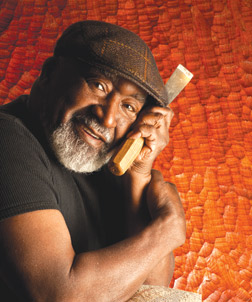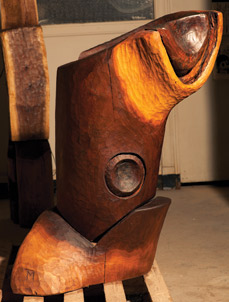Pitt Celebrates Black History Month With World Premiere Screening of Thaddeus Mosley: Sculptor
 Sculptor Thaddeus Mosley
Sculptor Thaddeus MosleyUniversity of Pittsburgh Chancellor Mark A. Nordenberg and Pitt Vice Chancellor for Public Affairs Robert Hill will cohost a private program and reception Feb. 1 for the world-premiere screening of Thaddeus Mosley: Sculptor—a documentary chronicling the life and artistic career of the renowned Western Pennsylvania sculptor and 1950 graduate of Pitt’s Kenneth P. Dietrich School of Arts and Sciences.
The 45-minute documentary is the work of filmmaker and Pitt alumnus Kenneth Love (A&S ’71). The Feb. 1 event, which will take place at the Twentieth Century Club, 4201 Bigelow Blvd., Oakland, is the Pitt 2012 K. Leroy Irvis Black History Month Program.
Thaddeus Mosley: Sculptor explores Mosley’s creative processes and provides unique insight into the sculptor’s background, individual style, and artistic influences. Love and fellow Pitt alumnus Barbara McNulty (MED ’75, A&S ’71), the documentary’s executive producer, capture Mosley working with gouge and chisel in his studio on Pittsburgh’s North Side and teaching at the Touchstone Center for Crafts in Farmington, Pa.
Included in the film is commentary by Richard Armstrong, director of the Frank Lloyd Wright-designed Solomon R. Guggenheim Museum in New York City; David Lewis, author of Thaddeus Mosley: African-American Sculptor (University of Pittsburgh Press, 1997); acclaimed poet and Pitt alumnus Ed Roberson (A&S ’70), a former Pitt English faculty member; Pitt alumnus and trustee William E. Strickland Jr. (A&S ’70), chief executive officer of Manchester Bidwell Corporation and recipient of a MacArthur “Genius” award; and Pitt alumnus Lynda S. Waggoner (A&S ’76), vice president of the Western Pennsylvania Conservancy, director of Fallingwater, and founding executive director of the Touchstone Center.
Mosley, who was born in New Castle, Pa., in 1926, earned his Pitt Bachelor of Arts degree in English after service in the U.S. Navy. He then worked as a sportswriter and sports photographer for The Pittsburgh Courier. Eventually, he took a job with the U.S. Postal Service, where he worked during the day for 40 years to support his family of six children, while he sculpted at night. The self-taught sculptor who works primarily in wood, collects cherry, walnut, and sycamore logs from the city’s Forestry Division and hauls them to his studio. He also finds stones at sites of demolished buildings and pieces of metal at area scrap yards. His finished works of art, many of them more than eight feet high, have been exhibited throughout the nation and at the Carnegie Museum of Art, Pittsburgh Center for the Arts (PCA), and Manchester Craftsmen’s Guild.

Mosley’s 14-foot Phoenix, made of cedar, graces the corner of Centre Avenue and Dinwiddie Street in Pittsburgh’s Hill District. The limestone Mountaintop stands outside the Martin Luther King Jr. Reading and Cultural Center on Herron Avenue, also in the Hill District, and Mosley’s Three Rivers Bench, carved in black walnut, is on the second floor of Pittsburgh’s David L. Lawrence Convention Center.
“Thad Mosley carves,” comments Armstrong in the film. “He takes away excess and, like Michelangelo, he reveals.”
According to the film, Mosley finds inspiration for his works in poetry, jazz, and dance, and his artistic explorations in materials, form, and rhythm overlap with his other roles as father, teacher, mentor, and friend.
“We showed that for Thad, art is more than something he does. It is the way he lives his life,” said Love.
Among Mosley’s honors are the 1999 Governor’s Award for Artist of the Year in Pennsylvania Visual Arts, the PCA 2000 Cultural Award, and the PCA Service to the Arts Award and Exhibition.
Support for Thaddeus Mosley: Sculptor was provided by the University of Pittsburgh, The Pittsburgh Foundation, the Gruber Foundation, The Fine Foundation, and the Heinz Endowments.
About the Filmmaker
Kenneth Love started his career as a documentary filmmaker in 1971, while he was a senior at the University of Pittsburgh. His recent documentary, Fallingwater: Frank Lloyd Wright’s Masterwork, premiered at the Guggenheim Museum in Fall 2011. His first independent film, Fallingwater: A Conversation with Edgar Kaufmann Jr., premiered in 1994 at the Museum of Modern Art in New York City and was recently shown at the Louvre in Paris. Other Love films include Samuel Rosenberg: Pittsburgh’s Painter Laureate (2008), Clyde Hare’s Pittsburgh (2005), Brilliant Fever: W. Eugene Smith and Pittsburgh (2001), and One Shot: The Life and Work of Teenie Harris (2001).
Love’s documentary Newspaper of Record: The Pittsburgh Courier (2009), which premiered as Pitt’s 2010 K. Leroy Irvis Black History Month Program, will be aired on WQED-TV Feb. 2, 2012. Love has worked on more than 30 award-winning National Geographic television specials and garnered Emmy Awards for Serengeti Diary (1989) and Realm of the Alligator (1986). He earned an MFA degree in film and television from Carnegie Mellon University.
About Pitt’s K. Leroy Irvis Black History Month Program
Pitt began its annual Black History Month program in 2004 with the world premiere of the documentary K. Leroy Irvis: The Lion of Pennsylvania and renamed the observance in 2008 the K. Leroy Irvis Black History Month Program to honor the memory of the legendary Pennsylvania legislative leader and Pitt alumnus (LAW ’54) and trustee. Irvis, who in 1977 became the first African American speaker of the House of Representatives in Pennsylvania and the first Black speaker of any state house since Reconstruction, sponsored in 1966 the bill that made Pitt a state-related institution of higher education.
About Black History Month
Carter G. Woodson (1875-1950)—who earned a Harvard University PhD and was a celebrated American author, educator, and historian—initiated what he called “Negro History Week” in 1926. At the heart of the annual February observance, which in 1976 became Black History Month, is honoring African Americans who have struggled and achieved in their effort to advance in all walks of American life.
Other Stories From This Issue
On the Freedom Road

Follow a group of Pitt students on the Returning to the Roots of Civil Rights bus tour, a nine-day, 2,300-mile journey crisscrossing five states.
Day 1: The Awakening
Day 2: Deep Impressions
Day 3: Music, Montgomery, and More
Day 4: Looking Back, Looking Forward
Day 5: Learning to Remember
Day 6: The Mountaintop
Day 7: Slavery and Beyond
Day 8: Lessons to Bring Home
Day 9: Final Lessons

